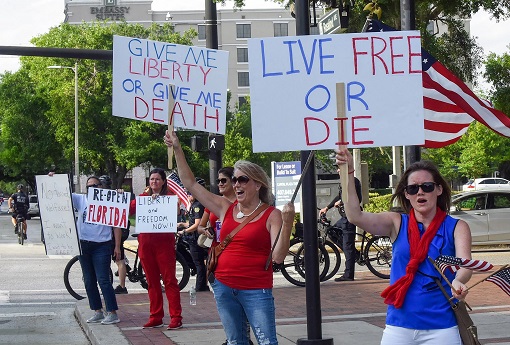The IMF said on Wednesday that the global economy is worse than it had projected earlier. Hence, the International Monetary Fund slashed the world economic growth – again. Since early this year, it has given out gloomy news. It was only in January that the IMF had forecasted a global GDP (gross domestic product) expansion of 3.3% in 2020 and a growth rate of 3.4% in 2021.
Back then, it was cautious about the state of the global economy primarily due to concerns about new trade tensions between the U.S. and the EU, as well as the fragile “Phase One” trade deal between the U.S. and China. However, the Coronavirus outbreak changes everything. Those trade wars or disputes between the U.S. and China were seen like child’s play.
So in April (2 months ago), the IMF revised its January’s forecast of a 3.3% growth to a contraction by at least 3% instead in 2020. In essence, it meant a loss of 6.3% in the worldwide economy. The huge drop in growth was derived as more institutions warn that the “Great Lockdown” due to the Covid-19 pandemic was bringing massive damage to the economy.

But the doom and gloom prediction was just the beginning. On Wednesday, the IMF said the global economy will shrink this year by 4.9% – worse than the 3% decline predicted just 2 months ago (April). It gets another downgrade. This is clearly a mind-boggling swing of 8.2% global GDP in just 6 months – from a positive 3.3% growth (January) to a negative 4.9% slump (June).
No major economy can escape the Coronavirus pandemic. According to the IMF’s latest forecast, the U.S. economy – the world’s largest – is expected to shrink this year by a whopping 8%. China’s growth will be a mere 1% gain. Meanwhile, the economy of European countries would experience a decline of more than 10%. Japan’s output will fall by 5.8%.
If you still don’t think all those mumbo-jumbo numbers mean anything, just wait. It means by the end of next year, the global economy’s output will lose US$12.5 trillion. The IMF said its downward revision was due to the impact on productivity and supply chains as a result of social distancing measures which will likely remain in place during the second half of the year.

To make matters worse, on the same day the IMF released its gloomier economic outlook, the U.S. reported a record number of new Coronavirus cases in 1 day – 45,557 cases. It is the highest since April 26, the first peak of the pandemic in America. It has gotten so bad that travellers from U.S. hot spots who arrive in New York, New Jersey and Connecticut will be asked to quarantine for 2 weeks.
The eight states categorised as hot spots of Covid-19 are Alabama, Arkansas, Arizona, Florida, Texas, Utah, North Carolina and South Carolina. Anyone found breaking the quarantine could face fines of US$1,000 and would increase to US$5,000 for repeated violations, declared the New York Governor Andrew M. Cuomo.
In Florida, where more than 109,000 cases have been reported, the availability of ICU (intensive care units) for adult is only 21%. It’s worse in Arizona, where only 12% of ICU beds are available. Even California, the state that has earned praises from Dr. Anthony Fauci, director of the National Institute of Allergy and Infectious Diseases, has recorded its biggest single-day jump – 7,149 new cases.

So far, the U.S. has recorded more than 2.3 million cases of the virus and more than 121,000 deaths. However, the University of Washington now predicts 180,000 U.S. deaths by October – or 146,000, if 95% of Americans wear masks. But Coronavirus cases are hitting the roof among young Americans, who have already started going out again, but without masks.
In Florida, for example, young people ages 15 to 34 now make up 31% of all Covid-19 cases, up from 25% in early June. To make matters worse, some states like the Florida’s governor has refused to re-impose restrictions, arguing that the young infected people are still healthy as compared to older vulnerable people. Such ignorance will come back to haunt them later.
But the spike in Coronavirus cases due to a premature reopening of U.S. states is just one of many problems that are spooking the economy and stock markets. The latest jobless claims have just been released, and it’s not sexy. Jobless claims totaled 1.48 million last week, higher than the expectation from economists and analysts who had estimated 1.35 million claims.

The latest number marked the 14th consecutive week that American jobless claims remain above 1 million. It is now feared that if new Coronavirus cases continue to spike, people who have come out to support the local business will start again to stay away from restaurants and malls. Like it or not, the mantra that says when the U.S. sneezes, the world catches a cold is still very true.
Still, the Trump administration and some bullish financial analysts are arguing that the U.S. will end up with a strong, V-shaped rebound, with economic activity skyrocketing right back to where it was in no time. Actually, the Wall Street has largely ignored the pandemic and thanks to money printing exercise by the Federal Reserve, the stock markets seem immune to the virus.
But according to the Congressional Budget Office (CBO), the American economy will shrink the size of the U.S. economy by about US$8 trillion over the next decade (from 2020 to 2030), even with all of the rescue funding being poured in to offset the impact of Covid-19. “Business closures and social distancing measures are expected to curtail consumer spending,” – said CBO Director Philip L. Swagel.

Other Articles That May Interest You …
- Second Wave Of Covid-19 Has Begun In The U.S. – But Not Everyone Cares, And They Would Pay The Price
- Trump & Stock Markets Celebrate Stunning Jobs Report – But The Labour Dept Admits There’s A “Miscalculation Error”
- Trump Faces Huge Problem Getting People Back To Work – They Earn More Free Cash Staying At Home
- From Terminating Trade Deal To Cancelling $1.1 Trillion Debt Owed To China – Here’re Some Of Trump’s Crazy & Dirty Ideas
- Lawsuits For Trillions Of Dollars Against China Over Spread Of Coronavirus – Here’s Why It’s A Waste Of Time
- 22 Million Jobless – Desperate Trump Blames China & Declares Worst Is Over, Despite Coronavirus Deaths Hit New Record
- IMF – The “Great Lockdown” Is Set To Triggers The World’s Worst Recession Since The 1929 Great Depression
- 3 Coronavirus Variants Discovered – Surprisingly, “Type-A” Found In Americans, Wuhan’s Type-B And Type-C In Europe
- Trump Admits Coronavirus Could Kill 240,000 Americans – But Document Shows The U.S. Army Had Warned Him 2 Months Ago
- China Appears To Be Winning The Coronavirus War, And Other Countries Are Studying How The Chinese Did It
- Arabs Conspiracy Theories – Coronavirus Is The U.S. & Israel Biological Warfare To Cripple China’s Economy & Reputation

|
|
June 25th, 2020 by financetwitter
|


|

|

|

|

|

|




























Comments
Add your comment now.
Leave a Reply